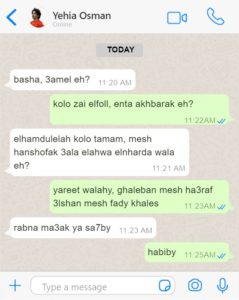Today we are back with Egyptian Arabic Conversation 14.
In each Conversations post, we will provide you with:
- a screenshot from an actual conversation between two Egyptians
- the translation of each line of text, including English, Franco and Arabic script
- context on the conversation and further explanation
We think learning Egyptian Arabic from actual, authentic conversations between Egyptians is both fun and effective. We hope you like it too!
Let’s get started with Egyptian Arabic Conversation 14: God Be With You.
Egyptian Arabic Conversation 14: God Be With You
As always, we will start out with a screenshot of a WhatsApp conversation in Egyptian Arabic.

The conversation is in Franco, but we put the actual Arabic below.
Before getting started with this Conversations post, be sure to check out our post on writing in Franco Arabic.
Egyptian Arabic Conversation 14: Translation
One note before we get started – this is a conversation between two men.
We will be creating more conversation posts with women speakers as well.
This makes it easier for everyone to make sure they are conjugating verbs correctly.
Stay tuned!
Yehia: Dude, how are you? : Basha, 3amel eh?
باشا عامل ايه؟
Mostafa: All is well, how are you? : Kolo zai elfoll, enta akhbarak eh?
كله زي الفل انت اخبارك ايه؟
Yehia: Thank God everything is good, are we going to see at the ahwa today or what? : elhamdulelah kolo tamam, mesh hashofak 3ala alahwa elnharda wala eh?
الحمدلله كله تمام مش هنشوفك على القهوة النهاردة ولا ايه؟
Mostafa: I wish I swear…probably I won’t make it because I’m not free at all. : yareet walahy, ghaleban mesh ha3raf 3lshan mesh fady khales.
.ياريت والله..غالبا مش هعرف علشان مش فاضي خالص
Yehia: God be with you my friend. : rabna ma3ak ya sa7by.
.ربنا معاك يا صاحبي
Mostafa: Thanks (habiby). : habiby.
.حبيبي
Egyptian Arabic Conversation 14: Important Vocabulary
Dude: Basha.
.باشا
This is just a common Egyptian Arabic nickname.
It’s also a way of saying “sir”, but it’s dependent on the situation.
All is well : Kolo zai elfoll.
.كله زي الفل
Literal translation: Everything is like the daisies.
How are you? : Enta akhbarak eh?
انت اخبارك ايه؟
One of the most common ways to ask somebody “how are you” in Egyptian Arabic.
Literally means “You your news what?”
It’s not strictly necessary to say enta / enti at the beginning of akhbarak/ik eh (male/female), but you can if you want to. This extra word (“you”) is basically just emphasizing that you want to ask them about themselves as well.
Are we going to see you… : mesh hanshofak…
…مش هنشوفك
This is technically “not we are going to see you”, but you get the idea.
Look into the grammar rules of the word “mish” to understand this phrase a bit better.
I wish I swear. : yareet walahy.
.ياريت والله
This is a pretty common thing to say when you want to emphasize how much you want to do something that you don’t think you have the time for.
God be with you : rabna ma3ak.
.ربنا معاك
Just a nice thing to say. It’s normal when you want to show somebody that you feel sorry for them, or sympathize with them.
Could be used in many situations.
Thanks (habiby). : habiby.
.حبيبي
As we have said, the word habibi can basically be used as a way of saying thank you in Egyptian Arabic.
Context + Further Explanation
This is a friendly conversation between two Egyptian guys.
As we’ve said before, the Egyptian ahwa is a staple of Egyptian culture. Many Egyptians will go to one with their friends at least once a week…but sometimes they’re simply too busy.
Life in cities like Cairo can be stressful with some of the world’s worst traffic, noise, and low wages. Plus many Egyptians work long hours – it shouldn’t surprise us that Mostafa isn’t free that night.
…
Happy learning,
Cleo Lingo

